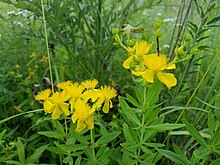Hypericum swinkianum, known as Swink's St. John's wort,[3] is a shrub in the St. John's wort family. It was named after Chicago Region botanist Floyd Swink (1921-2000).[3]
| Hypericum swinkianum | |
|---|---|

| |
| Scientific classification | |
| Kingdom: | Plantae |
| Clade: | Tracheophytes |
| Clade: | Angiosperms |
| Clade: | Eudicots |
| Clade: | Rosids |
| Order: | Malpighiales |
| Family: | Hypericaceae |
| Genus: | Hypericum |
| Section: | H. sect. Myriandra |
| Subsection: | H. subsect. Centrosperma |
| Species: | H. swinkianum
|
| Binomial name | |
| Hypericum swinkianum | |

| |
| Known occurrences of Hypericum swinkianum[1][2] | |
Description
editSwink's St. John's wort is a many-branched shrub up to 1.8 meters (5.9 ft) high.[1] It has exfoliating bark. The leathery, oblong leaves reach 2 centimeters (3⁄4 in) in width and 5 centimeters (2.0 in) in length, with weakly revolute edges. The flowers are produced in terminal flowerheads known as dichasia. Each dichasium produces 7-31 bright yellow flowers, each with 5 petals and numerous yellow stamens. The capsules are 5-parted. In the Chicago Region, it blooms between July and August.[3]
Hypericum swinkianum differs from the closely related Hypericum kalmianum by its notably larger vegetative features, flowerheads each averaging more than 7 flowers, and an affinity toward acidic rather than calcareous habitats.[1]
Distribution and habitat
editSwink's St. Johns wort is known to occur in sand flatwoods and acidic wet to wet-mesic sand prairies in the western Great Lakes region in the United States, including Illinois, Indiana, and Michigan.[1][3] It is a highly conservative species with a coefficient of conservatism of 10 in the Chicago Region[3] and in Michigan.[2]
References
edit- ^ a b c d e Wilhelm, Gerould; Rericha, Laura (2016). "A new species of Hypericum (Hypericaceae) and some new combinations in the vascular flora of the Chicago Region" (PDF). The Michigan Botanist. 55: 89–96.
- ^ a b "Hypericum swinkianum". Michigan Flora. Retrieved 2018-12-11.
- ^ a b c d e Wilhelm, Gerould; Rericha, Laura (2017). Flora of the Chicago Region: A Floristic and Ecological Synthesis.